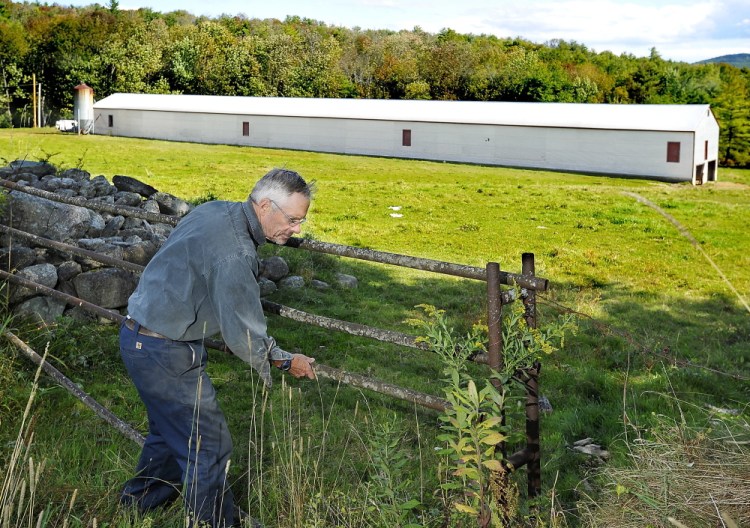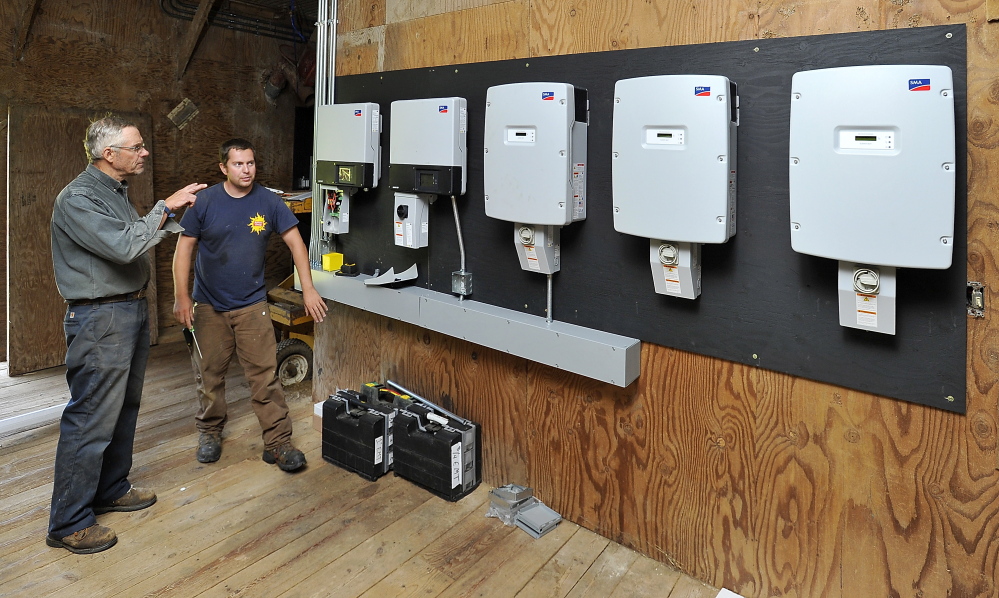Falling prices for solar-electric panels are enticing Mainers who want to install them at their homes. That’s not an option, however, for Jim Atwell, an environmental engineer from Falmouth. He lives in a condominium, and the homeowners’ association won’t allow a solar array on the roof.
But starting next month, Atwell will begin meeting 80 percent of his annual electric demand with solar panels – installed 50 miles away on the roof of an old chicken barn in the Oxford Hills.
Atwell will become one of nine Mainers who are shareholders in the state’s first community solar farm. The farm is a shared solar project that feeds power from the sun into the electric grid. Each member owns a slice of the total power produced and gets a credit on his electric bill. After the initial investment is repaid, the shareholders’ electricity is essentially free.
Atwell’s 12 percent share in the project is costing him roughly $14,000, and he’ll save an estimated $1,100 a year on his bill. That’s a long payback, but money isn’t his primary motivator.
“I think it’s the right thing to do,” he said. “It’s something I believe in.”
Community solar farms are beginning to catch on in a handful of states with laws that specifically allow these interconnections. The Solar Gardens Institute, which advocates for their development, lists two dozen projects on its website, the majority of them in Colorado.
The soon-to-be-installed farm in Maine is a pilot project that had some unusual financing and regulatory hurdles to clear. But developers hope it will pave the way for a second community solar farm being planned in the Damariscotta area. There also are expressions of interest on Chebeague Island and in Portland and South Portland.
“This is proof of concept, and success will be nine happy customers,” said Fortunat Mueller, co-founder of ReVision Energy in Portland, which is developing the project. “But we’re excited about the long-term market potential. We want to make it easy and repeatable.”
ReVision has been working on the venture for two years. The incentive came after calling on potential customers who wanted to go solar but couldn’t. Some lived in multi-unit buildings, as Atwell does. Others had shady lots or roofs that didn’t face south.
A section of Maine utility interconnection law allows up to 10 customers to share ownership of a renewable energy project. But the provision, known as group net metering, was untested. ReVision won a $40,000 grant from Efficiency Maine to help set up the legal framework.
During the process earlier this year, Central Maine Power Co. sought clarification of the rule from state regulators. That sent the matter to the Public Utilities Commission, where the project was ultimately approved. Advocates now hope they can persuade the Legislature next year to raise the number of customers allowed under the law. In Colorado, for instance, a solar farm on a south-facing hill at the Garfield County Regional Airport serves up to 350 members.
“We know this idea works and consumers are in favor of it,” said Steve Hinchman, a lawyer who represented ReVision at the PUC. “But the economies of scale are limited, due to this arbitrary number of customers.”
Beyond regulatory approval, ReVision needed a site. It found one at Sunnycroft Farm on Paris Hill.
Russ and Judy Florenz had worked with ReVision three years ago to convert their oil-fired hot water system to solar. They were interested in solar electricity but didn’t have room on the farmhouse roof. That led to a discussion about their three south-facing barns and, eventually, a willingness to host the community solar farm. The Florenzes are buying an 8 percent share of the project and will get lease payments for the solar array, which will be installed next month on their former chicken barn.
The array will consist of 200 panels and cover 3,500 square feet. It’s designed to generate 60,000 kilowatt-hours a year, which should meet the electric demands of the nine members. The project will cost more than $150,000 to build, but the final cost to the members will be less because of a 30 percent federal tax credit and the potential sale of renewable energy credits.
The project caught the attention of Sarah Lachance, who lives in an older home in Kennebunkport that’s shaded by two large chestnut trees. Active in the 350 Maine network that fights climate change, Lachance said she wants to feel like she’s part of a solution. She’s buying a 9 percent share in the project, scaling her investment to help offset the electricity needed to charge her car, a Toyota Prius Plug-in.
“I’m a good example of someone who wants to do the right thing and put solar on my roof, but I can’t,” she said.
Charging a hybrid-electric car also is a priority for Rudy Engholm of Cumberland Foreside, who already has 43 solar-electric panels on his home. Out of room for more panels, he sees the solar farm as a way to offset the charging needs of his Chevy Volt. He’s buying a 6 percent share for $6,283, the equivalent of 12 panels. The investment is expected to be paid off in less than 10 years, he said.
“We didn’t look at the payback at first,” Engholm said. “We look at it as future-proofing. If fuel prices rise, the payback will be even shorter.”
With the Paris Hill project nailed down, ReVision now is working to build a second solar farm for members of the Midcoast Green Collaborative in Damariscotta, a nonprofit group that promotes sustainable economic growth. Members of the group have been meeting with a local farmer, who, like Florenz, has a south-facing barn roof. They’re also talking to the local land trust and town officials about possible sites.
A co-founder of the group, Paul Kando, said up to 20 families seem interested, and he hopes a firm plan will come together this fall.
“We certainly have nine members to start with,” he said.
Damariscotta is an example of how future projects are likely to evolve, Mueller said, closer to where members live. In addition to Damariscotta, ReVision is talking with a landowner on Chebeague Island, as well as a condominium association and a church in Portland. The company also is having discussions with the city of South Portland about a possible project at the closed landfill, which is open, sunny and near power lines.
“You want to put them in places where the future is assured for 30 or 40 years,” Mueller said.
Send questions/comments to the editors.





Comments are no longer available on this story